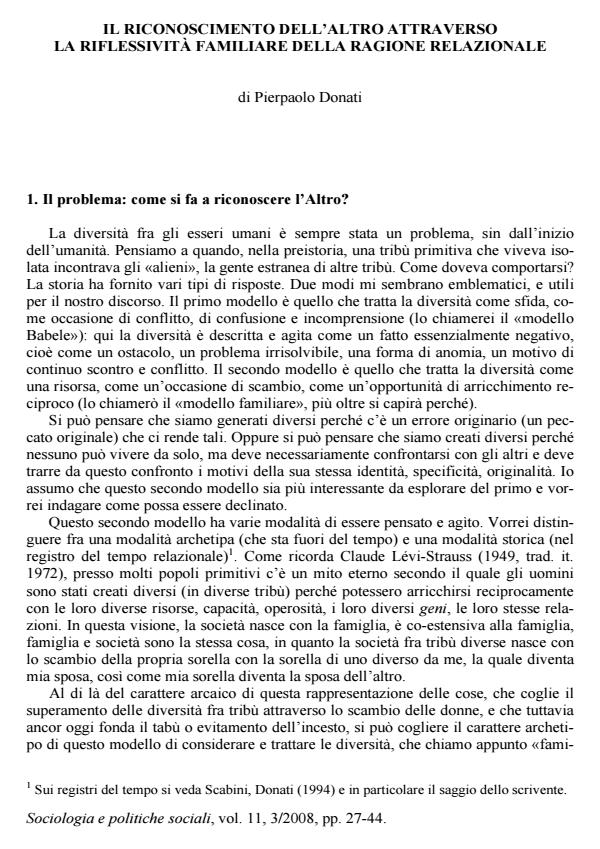Il riconoscimento dell'Altro attraverso la riflessività familiare della ragione relazionale
Titolo Rivista SOCIOLOGIA E POLITICHE SOCIALI
Autori/Curatori Pierpaolo Donati
Anno di pubblicazione 2009 Fascicolo 2008/3 Lingua Italiano
Numero pagine 18 P. 27-44 Dimensione file 194 KB
DOI
Il DOI è il codice a barre della proprietà intellettuale: per saperne di più
clicca qui
Qui sotto puoi vedere in anteprima la prima pagina di questo articolo.
Se questo articolo ti interessa, lo puoi acquistare (e scaricare in formato pdf) seguendo le facili indicazioni per acquistare il download credit. Acquista Download Credits per scaricare questo Articolo in formato PDF

FrancoAngeli è membro della Publishers International Linking Association, Inc (PILA)associazione indipendente e non profit per facilitare (attraverso i servizi tecnologici implementati da CrossRef.org) l’accesso degli studiosi ai contenuti digitali nelle pubblicazioni professionali e scientifiche
Recognition of the Other through the Familiar Reflexivity of Relational Reason - The study analyses the sociological problem of recognising the Other going beyond the mix of holism and individualism and instead proposing a relational vision that recognises the Other through the reflexivity of familiarity. This recognition is the result of a relational reason that, in order to be so, must necessarily be reflexive. The challenge of the widespread argument about the individualisation of the individual is turned into the argument of the personalisation of the person. According to the author, a human person is someone who, standing in between the bio-physical world and culture, develops through social interaction and reflexivity. We need a new scientific paradigm to understand how the human person can be both dependent on society and autonomous. In the differing ways of employing reflexivity (instrumental reflexivity, autonomous reflexivity, communicative reflexivity, value reflexivity), its capacity to achieve or not recognition as a relational good is revealed. In this process, the re-cognition through familiarity is no longer of pre-modern, modern or post-modern societies but of after-modern societies. The Autonomy of the Self: the Meadian Heritage and Its Postmodern Challenge by Hans Joas This paper addresses the question of the relationship between creativity and autonomy originally related to each other in the concept of the self as one of the crucial parts of the Meadian and symbolic interactionist heritage and asks how we should construe this relation today. After a brief reconstruction of the history of the notions of «self» and «identity» the paper takes up the postmodern challenge of these notions by clarifying and partially revising them. It discusses the three aspects of a possibly over-socialized conception of the person (we should not misunderstand intersubjectivity as continual intersubjectivity), the irreducibility of difference between socialized individuals, and the role of power and exclusion in processes of identity formation that can only succeed under dialogical conditions. Violence and exclusion may serve to stabilize identities and to this extent are functional equivalents of dialogical stabilization, but are not on their own able to serve as the basis for identity formation.;
Pierpaolo Donati, Il riconoscimento dell'Altro attraverso la riflessività familiare della ragione relazionale in "SOCIOLOGIA E POLITICHE SOCIALI" 3/2008, pp 27-44, DOI: